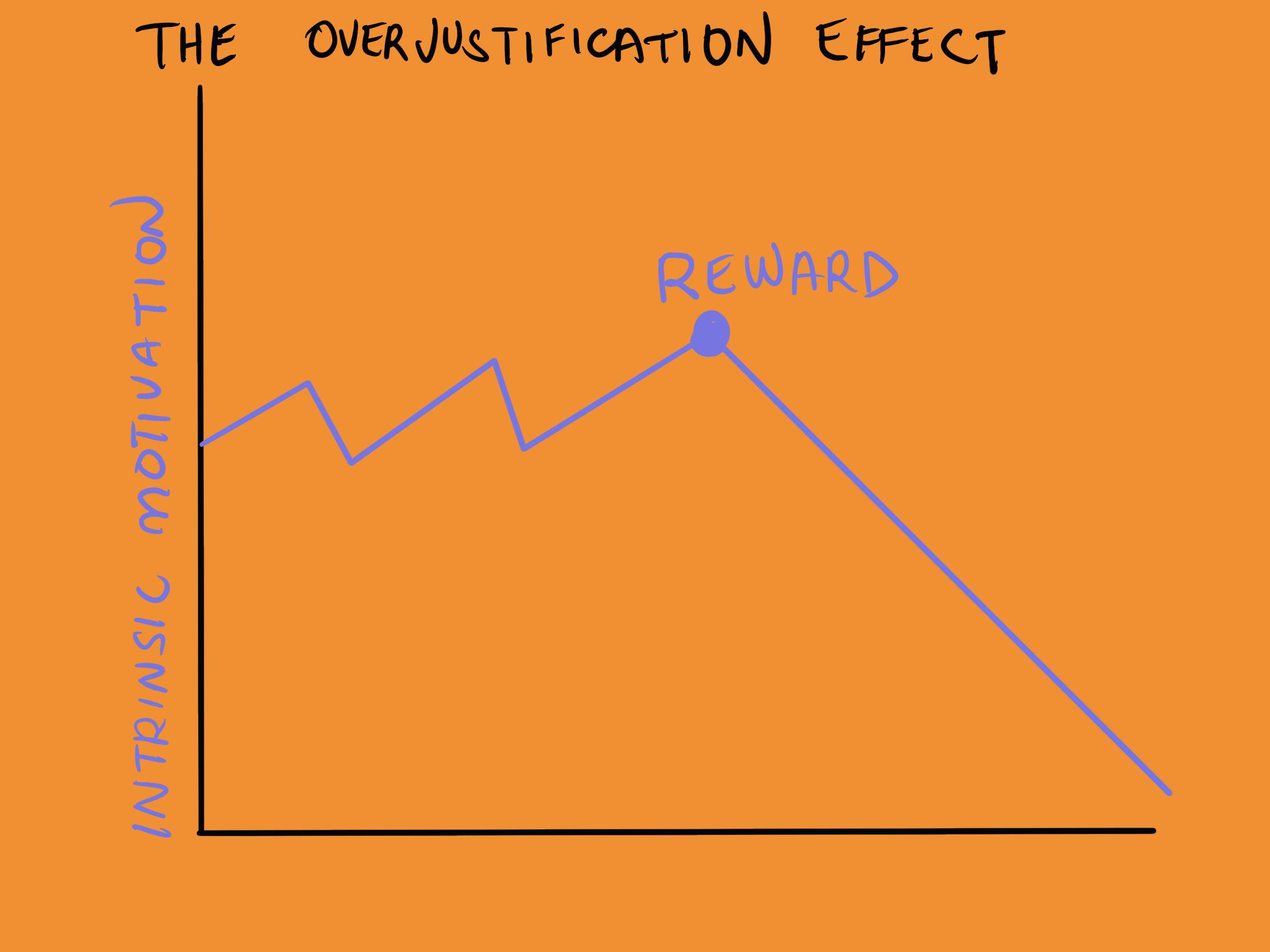Why do we lose interest in an activity after we are rewarded for it?
The Overjustification Effect
, explained.What is the Overjustification Effect?
The overjustification effect describes our tendency to become less intrinsically motivated to partake in an activity that we used to enjoy when offered an external incentive such as money or a reward.

Where this bias occurs
The overjustification effect occurs for any activity that we find intrinsically valuable. These are activities that we do because we enjoy them, rather than because we use the activity as a means to an end that we find rewarding.
For example, imagine that you have always loved painting because you find the activity calming. You start giving out paintings to friends and family as gifts, and a number of them suggest that you start selling them on Etsy. Thinking it might not be such a bad idea to make extra money, especially for an activity you love, you set up a page on Etsy and decide to charge people $20 for a painting. A while after you start painting to fulfill orders, painting no longer feels enjoyable. It feels like a chore.
Due to being offered money for an activity you love, you have lost the intrinsic motivation to paint. Intrinsic motivation is the motivation to do something without any obvious external rewards.1 Your intrinsic motivation to paint has been replaced with extrinsic motivation, which is motivation caused by an external reward, such as money.2 However, replacing your intrinsic motivation for money has actually caused you to feel less motivated to paint. Even if you stopped selling your paintings, it is unlikely that your intrinsic motivation would return, because you now attribute any enjoyment you derived from painting to the fact that you were being paid. This is known as the overjustification effect.
Debias Your Organization
Most of us work & live in environments that aren’t optimized for solid decision-making. We work with organizations of all kinds to identify sources of cognitive bias & develop tailored solutions.
Individual effects
The overjustification effect is an undesirable cognitive phenomenon. It can cause us to abandon activities that we actually find intrinsically valuable once we are presented with a prize or money for doing the activity. Instead of the rewards adding value to the activity, they take away from it. Consider the saying, “money can’t buy you happiness”. The overjustification effect captures this belief by suggesting that intrinsic motivation and enjoyment is diminished by money.
The overjustification effect may be the reason behind why we so often complain about our jobs, even if we are interested in what we are doing. Since we are getting paid for completing tasks at work, we attribute our salary as the primary reason for what we do. We feel forced to complete the tasks because otherwise we wouldn’t get paid, which causes us to forget that we may actually enjoy the activity otherwise. Money and other extrinsic rewards often overshadow any other motivators.
Yet, it’s not as though working for free is sustainable or realistic. Bills still need to be paid. Does the overjustification effect mean that we shouldn’t do something we love as our job? That seems counter-intuitive. What the overjustification effect might tell us is that it is important to keep some of our hobbies as just hobbies, rather than try to benefit monetarily from them, in order to prevent loss of the intrinsic value of partaking in that activity.
Systemic effects
Motivation is hugely important, especially in today’s society where we are bombarded with endless options for how to spend our time. Being motivated to perform a task often improves performance; therefore, it is important for companies and leaders to understand how best to motivate people. Without being intrinsically motivated, people can lose sight of why they want to partake in an activity. This can lead to people quitting their jobs, giving up on school, and casting aside their passions. Lacking motivation can also be a contributor to depression, and in turn, ends up being a barrier to overcoming depression too.3
Since motivation is such an important factor in our lives, companies and organizations are always looking for ways to motivate people. However, these often come in the form of extrinsic rewards, as some research suggests that rewards can motivate people or act as reinforcement for a job well done. It is therefore important that we understand when overjustification occurs, in order to ensure rewards are being used effectively and cautiously, if at all.
Why it happens
There are a number of reasons as to why the overjustification effect exists. Important to many theories is the idea that as humans, we aren’t necessarily the best at figuring out what motivates our decisions and our behavior.4 When an extrinsic motivator is presented, we come to believe that it is the only reason we are performing an activity. This may occur because of the self-perception theory, which states that we learn about our likes and dislikes by observing our own behavior.4 We understand our motivation after an activity has occurred. If we complete a task for its intrinsic value, we observe that we chose to do the task. Alternatively, if we complete a task and are rewarded for it after the fact, we will come to believe we only did it for the reward.4
Another theory for the overjustification effect suggests that external motivation is seen as a coercive force. If a task doesn’t feel voluntary, then we might enjoy it less. Extrinsic motivation ends up feeling like a bribe and we feel pressured to do an activity. We no longer feel enjoyment from the activity because it feels less like a personal choice and more like a forced behavior.5 Intrinsic motivation is seen as a result of free choice, whereas extrinsic motivation makes us feel like we are being controlled.6
Another theory suggests that we are actually good at generating intrinsic motivation. When we complete an activity, we seek out enjoyment and find an intrinsic value in the activity. Alternatively, if we are presented with a reward, we may see that reward as the only reason for completing the activity and therefore not find the activity fun in itself.7 When we become focused on an external motivator we have less room to find our own personal value to gain from an activity.
Why it is important
Motivation, or the lack thereof, is one of the biggest barriers to success and efficiency. It is a huge factor in learning, which is something we do throughout all stages of our lives.
As children, our curiosity is often enough to get us interested in learning. However, once we go to school, getting good grades becomes the motivator for learning and reduces how much we actually enjoy the process. Similarly, we may take on a job because it interests us, but once a salary is a quantifier motivating us to perform our tasks, we no longer enjoy the work.
Since important aspects of our lives, like education and employment, are easily affected by the overjustification effect, it is important that we understand it. While it is hard to get rid of all external rewards, like good grades or a salary, the overjustification effect demonstrates that it is important to remember the intrinsic value of activities in order to retain motivation. By understanding exactly how the overjustification effect manifests itself, educators and companies can most efficiently decide how and when to incentivize people through external rewards, as will be explored in the following section.
How to avoid it
Being aware of the overjustification effect can help us decide to keep a few of our passions and hobbies as activities that we do just for fun instead of seeking out an external reward to complete them. However, being aware of the overjustification effect does not help us to not be influenced by extrinsic motivators once they are presented to us. Additionally, money as a motivator cannot be wholly ignored, because we need to earn a decent wage to pay for things like food and rent.
It is therefore important for companies and leaders to take the overjustification effect into consideration when they decide how best to motivate their employees or the public. Rewards are often believed to be a good way to motivate people, however, the overjustification effect suggests that this is only the case for particular kinds of tasks.
The overjustification effect only occurs for tasks that have intrinsic value to people, not for tasks that we wouldn’t enjoy.7 This means that incentives should be reserved for boring tasks. For example, a chef in a restaurant may think of inventory as the worst part of his job, because he does not find it intrinsically valuable, whereas he finds cooking fun. Her boss can maximize motivation by offering up some kind of reward for completing inventory instead of cooking.
Moreover, the overjustification effect is thought to have a smaller influence when a reward is offered for doing the activity well, instead of just doing the activity. Since the overjustification effect is a problem for learning, parents can choose to offer rewards for performing well in school, instead of just going to school. For example, they may tell their son or daughter that they will give them $10 for every A they get. Since the external incentive is dependent upon doing something well, people see it as a motivator.5
How it all started
One of the earliest demonstrations of the overjustification was seen in an experiment conducted by Edward Deci in 1971.6 Edward Deci is a professor of psychology and a pioneer of behavioral science. Deci was curious about how external rewards affected intrinsic motivation, as a number of psychologists had suggested that extrinsic motivation causes intrinsic motivation to diminish.
Deci conducted an experiment on undergraduate students who already had a baseline interest in solving puzzles, suggesting intrinsic motivation. The students participated in three puzzle-solving sessions. In the first session, all students were asked to complete puzzles without a reward being offered. In the second session, those in the control group were once again asked to complete puzzles with no external incentive, whereas the experimental group was told they would receive $1 for each puzzle they completed during the session. In the third session, the control group underwent the same conditions, and the experimental group was told they would not be paid because there was not enough money available anymore.
Motivation was measured by seeing what participants decided to do when the experimenter left them in the room alone for eight minutes. The experimenter would let them know they were leaving for a few minutes and that they were free to do whatever they wanted while he was gone. Deci then measured how much time the participants worked on the puzzles while the experimenter was gone.
Deci found that when offered money in session two, participants spent over a minute longer on average working on the puzzle while the experimenter was gone. However, in session three, when the external motivator was removed, those same participants spent less time working on the puzzle than the control group did.6
From these results, Deci concluded that money, an external reward, caused intrinsic motivation to decrease, as participants in the experimental group no longer found doing the puzzles worth it once the financial incentive was removed. Alternatively, the control group’s behavior stayed relatively constant throughout the three sessions.6
Example 1 - Child's play
Deci’s study examined the way in which money affects intrinsic motivation. However, money may have different effects on motivation than other external rewards since it is a necessary component of modern life.
Mark Lepper, Joshua Greene, and Richard Nisbett, important figures in early behavioral science, wanted to examine whether the overjustification effect would occur for a non-monetary reward.8
The psychologists examined whether the overjustification effect influenced 3 to 5 years old children’s desire to draw with felt-tips, which is presumably an enjoyable activity. There were three different conditions to which children were assigned. In the first condition, the children were told they would receive a special ribbon for drawing with felt-tips. In the second condition, the children were not told about the reward they were going to receive until they had completed the activity. In the third condition, the children were not told about or given any reward for drawing. After, all children were observed in a “free-play” setting seven and 14 days after the experiment, to see if the experiment impacted how much they would later choose to draw.9
Lepper, Greene, and Nisbett found that the children who had been promised a reward for drawing during the study played significantly less with the felt-tips during free play. However, the children who were surprised with a reward still showed interest in drawing afterwards. The psychologists concluded that knowing about a reward causes children to believe they enjoy drawing only because of the reward, instead of the activity itself, and that intrinsic enjoyment for an activity does not return after the reward is no longer an option. They also concluded that the overjustification effect only occurs if the reward is expected.8
Example 2 - Rewards for successful performance
As previously mentioned, the overjustification effect has a smaller presence when rewards are given for performing well instead of simply completing a task. Motivation can be a huge factor in how well children with learning disabilities perform, meaning that it is important to understand the nuances of the overjustification effect to ensure we are careful with how extrinsic rewards are used.
Dr. Robert Eisenberger, a professor of psychology wanted to examine the overjustification effect with regards to children with learning disabilities in order to improve methods for teaching them, Eisenberger conducted a study on 10 preadolescent children with learning difficulties.10
The students were tested in their reading capabilities. Baseline capabilities were first measured to be able to judge how students were performing during the experiment. During the experiment, one group, the “accuracy group”, received tokens that they could exchange for toys when they read aloud with fewer errors. Another group, the “speed group”, received tokens when they read more quickly. The control group received tokens regardless of their accuracy or speed.10
After the reading tasks, students performed drawing and story construction tasks. Eisenberg found that students who had been rewarded for a specific skill in reading, either speed or accuracy, were faster or more accurate respectively in the following drawing and story construction tasks. The students in the control group, who had been rewarded for completing a task rather than for performing it well, were both slower and less accurate in the subsequent drawing and construction tasks.
From these results, Eisenberg concluded that the overjustification effect occurs for children with learning disabilities only when the reward is not linked to the student’s effort and performance. When the reward is tied to a specific skill completing a task successfully, it acts as a reinforcement of that skill, instead of diminishing the intrinsic motivation.10
Summary
What it is
The overjustification effect describes the phenomenon where we lose intrinsic motivation to complete an activity that we used to enjoy for itself after a reward, such as a prize or money, is given to us for completing the activity.
Why it happens
The overjustification effect occurs because when an external reward is given to us for completing an activity, we evaluate that our enjoyment for that activity came from the reward rather than the activity itself. The extrinsic motivator, the reward, replaces our intrinsic motivation to complete the task. This causes us to believe that completing the task was not voluntary because we feel coerced by the reward.
Example 1 – The overjustification effect impacts playing
The overjustification effect still has an impact on activities that seem obviously enjoyable to children, such as drawing with felt-tips. If children are rewarded for drawing, they are less likely to want to draw for fun in the future. The overjustification effect causes children to attribute their enjoyment of drawing to the reward instead of the activity.
Example 2 – Rewards for specific skills diminishes the overjustification effect
The overjustification effect only impacts motivation if the external reward is given for mere completion of a task, instead of performing well in a task. When students with learning disabilities were given rewards for a specific skill when reading, they performed better with regards to that skill in subsequent activities. This suggests that if a reward is linked to effort and success, it acts as a reinforcement and does not trigger the overjustification effect.
How to avoid it
By understanding the specific ways in which the overjustification effect manifests itself, teachers and employers can ensure that they are careful and considerate when it comes to giving out rewards. As the overjustification effect is only seen for tasks that people find inherently enjoyable, rewards can be reserved for menial and boring tasks. Additionally, if rewards are given to people for performing well in a task, the overjustification effect is less likely to be seen, so teachers and employers can ensure that rewards are only used to motivate people to do well.
Related TDL articles
Can Money Buy Good Health? – RCT of Financial Incentives for Weight Loss
In this article, our writer Maral Yeganeh, a post-doctor fellow in neuroscience, examines how financial incentives impact the amount of weight that people lose. She outlines a study where overweight individuals were offered money as an incentive to lose weight in a 16-week program, and a control group of overweight individuals were not offered any money. While participants that had received financial rewards had lost more weight than individuals in the control group after the 16 weeks, those same participants gained weight between the end of the program and the seven-month checkup. This provides evidence that the overjustification effect means that when a reward is taken away, intrinsic motivation does not return.

